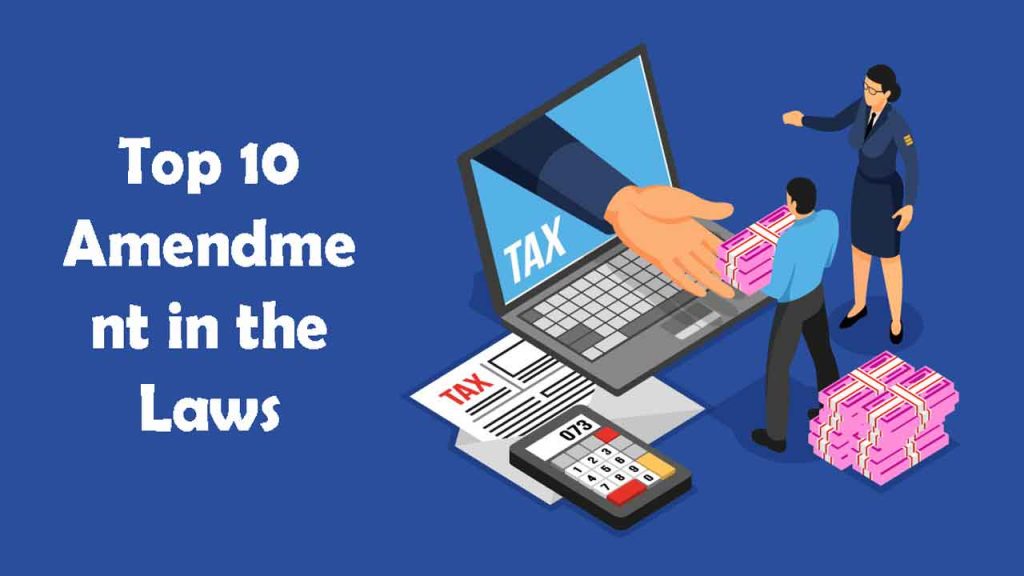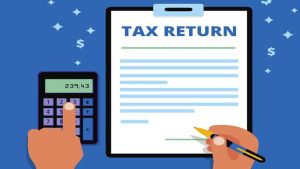Amendment in the Income Tax – Income tax is a direct tax levied by the government on the earnings of its residents. The Income Tax Act of 1961 requires the central government to receive this tax. Each year, the government will amend the income tax brackets and rates in the Union Budget.
Income often does not refer to money received in the shape of a salary. It also encompasses revenue from real estate, enterprise earnings, professional gains (such as bonuses), capital gains dividends, and ‘income from other sources.’ The government also frequently allows for different deductions from a taxpayers income prior to calculating the tax to be imposed.
Amendment in the Income Tax

No Income Tax filing for citizens above 75 years:
Our Finance Minister of India Nirmala Sitharaman declared in Union Budget 2021 that the senior citizens who are above the age of 75 years, and who have only pension and interest as a source of income, will be exempted from filing their income tax returns (ITR). This type of senior citizens only has not been exempted from filing the ITR only in the case where the interest income is earned from the same bank from where the pension is deposited.
Must Read – Amendment in tax laws from 1st April 2021
Limited numbers of Banks:
The government of India has allowed only a few banks where the account holders will be available for this kind of exemption and they have to provide the declaration from the specified banks. After this, the specified bank will have to provide a declaration of the allowable under Chapter VI-A and rebate the allowable under section 87A of the Act, for the relevant assessments years and the deduct income for these assessments after that.
Pre-filled ITR forms:
The ITR forms will now first have to pre-filled the information on the dividend, interest and capital gains to reduce the compliances from the individual’s taxpayers. The details of the capital gains from the listed securities, dividend income, and interest from the banks, post office, etc. will also come through pre-filled. The details of salary income, tax payments, TDS, etc. will be there in the ITR forms.
EPF Contributions:
The interest rate of the employee’s shares of the contributions to the Employees Provident Fund (EPF) on 1 April 2021, which will be taxable at the stage of the withdrawal if it exceeds the amount Rs. 2.5 Lacs in any year. Then it will lead to additional taxes liability, especially from the High Networth Individuals (HNIs) who contribute the higher contributions and it will also discourage the voluntary provident fund (VPF) contributions. This along with the taxations of aggregates employers contributions in the excess of the amount of Rs.7.5 Lacs to EPS, NPS and superannuation fund and interest thereon introduced in the last years, can make the EPF and even less than the attractive retirements schemes.
REIT/InvIT Exemption:
The government of India has declared to make the dividend payments to the Real estate investments trusts (REITs) and infrastructures investments trusts (InvITS) exempt from the TDS. The government of India has declared that the advanced tax liability on the dividend income shall arise only after the declarations of the payments of the dividends as the amount of the dividend income cannot be estimated correctly by the shareholder for paying the advanced taxes. The government of India has abolished the dividend distributions tax to incentivise investments and the dividend was made taxable in the hands of the shareholders in the budget of last year.
Higher TDS for non-filers of income tax returns:
The government of India has declared the new sections 206AB in the Income Tax Act as a higher provision for providing a higher rate for TDS for the non-filters of income tax returns. The TDS rate in these sections will have been twice the rate of 5%.
ULIPs Plans:
The government of India has brought the Unit Linked Insurance Plans (ULIPs) Under this type of tax brackets. Currently, The redemptions of the ULIPs are a type of tax-exempt that provides the total premiums which are payable for the policy which does not exceed more than 10% of the assured sum. Under this proposal of the government, the redemption of the ULIPs issued on or after 1 February 2021 where this annual premium is payable by the individuals the amount exceeds Rs. 2.5 Lacs would be subjected to the capital gains taxes, at par with the equity-oriented mutual funds.
LTC scheme notified:
The employees can still avail the exemptions for the leave travel concessions (LTC) of one-third of the specified expenditures or the amount of Rs. 36,000 whichever the amount is less, for the block of 2018-21 if they have incurred the expenditures on the purchase of goods and services which are liable to the GST @ 12% or more will provide the payments is made via non-cash mode and incurred during the period of time during 12 October 2020 to 31 March 2021. This amendment is proposed to be for the financial years 20-21 only.
Tax holiday on affordable housing extended:
The government of India has extended the additional taxes the amount deductions of Rs. 1.5 Lacs on the interest paid on the housing loans for the purchase of affordable homes by one more year to 31 March 2022. There is an additional deduction of Rs. 1.5 Lakh over and above Rs. 2 Lakh was introduced in the budget for 2019. This was allowed for those peoples buying homes for the first time and of up to the Rs. 45 Lakh cost.
Time Limit for filing delayed ITR Reduced:
There is the last date for filing revised income-tax returns on a voluntary basis will now the 31 December after the closing of the financial year in place of 31 March 2022.



